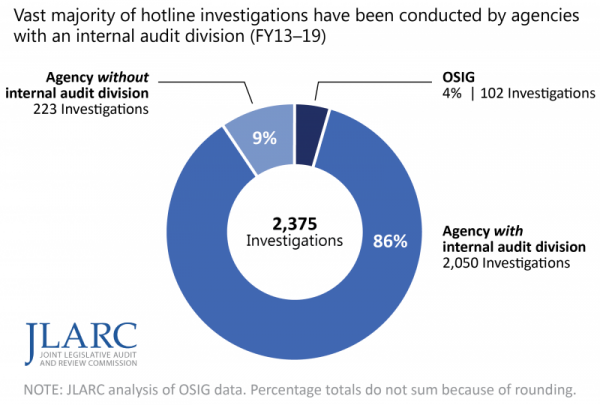Operations and Performance of the Office of the State Inspector General

WHY WE DID THIS STUDY
In 2018 the Joint Legislative Audit and Review Commission (JLARC) directed its staff to study the operation and performance of the Office of the State Inspector General.
ABOUT OSIG
The Office of the State Inspector General (OSIG) is a relatively new state agency that was created in 2012. OSIG took over some investigative staff and functions that existed at other agencies but also was given a new responsibility to conduct performance audits of state agencies.
WHAT WE FOUND
OSIG’s staffing has stabilized and employee satisfaction is high
The Office of the State Inspector General (OSIG) faced significant organizational challenges during its early years. The agency has had three different inspectors general since it was created in 2012. OSIG also experienced extraordinarily high staff turnover, largely because staff from other agencies were required to transfer to OSIG.
Under the current inspector general, though, OSIG is showing signs of stabilizing and beginning to build a positive organizational culture. OSIG’s current employees report being satisfied with OSIG as a place to work. Its staffing is stabilizing, and the agency now has a well-defined organizational structure, along with well-defined administrative and financial policies.
OSIG is not adequately fulfilling its intended role as a centralized investigative agency
OSIG has effectively promoted the State Fraud, Waste, and Abuse Hotline, providing multiple ways for employees and the public to report allegations of potential wrongdoing in state government. When OSIG conducts its own investigations, the investigations use appropriate techniques that result in sound conclusions. Its investigators are well qualified, experienced, and each is certified as an investigator by the Association of Inspectors General.
However, OSIG conducts few of the state’s investigations into fraud, waste, or abuse, despite its role as the state’s inspector general and its statutory duty to investigate such allegations. OSIG has conducted less than 5 percent of all investigations for the State Fraud, Waste, and Abuse Hotline since the agency’s inception; and most of its own investigations concern allegations of criminal conduct. The vast majority of investigations into allegations of administrative violations are conducted by other agencies’ internal audit divisions. Some administrative investigations are also conducted by designated “hotline coordinators” at agencies without internal audit divisions. These coordinators have other responsibilities and are not trained as professional investigators.
OSIG’s heavy reliance on other agencies to investigate allegations of fraud, waste, or abuse appears counter to legislative intent and inconsistent with Virginia’s transition to a centralized inspector general. A key benefit of a centralized, statewide inspector general is the ability to ensure that investigations are conducted independently by investigators with the proper training and experience.

OSIG has not adequately fulfilled its statutory responsbility to oversee behavioral health and developmental services facilities and providers
OSIG has met the requirement that it inspect Department of Behavioral Health and Developmental Services (DBHDS) facilities annually and established a complaint line to receive complaints from individuals receiving services from DBHDS or community-based providers regulated by DBHDS. However, OSIG has not adequately promoted the complaint line or established a structured process for investigating complaints.
More fundamentally, though, OSIG has done little else to meaningfully fulfill its statutory role to identify issues related to quality and safety that need to be addressed. Its oversight of community-based providers has been minimal. It also has done little to analyze available DBHDS data to identify problems across facilities or providers.
OSIG has struggled to build a fully effective performance audit function
OSIG’s performance audit function is still a work in progress. When it was created, OSIG had few staff with the expertise to conduct performance audits. Consequently, OSIG built staff capacity over time and now employs 15 performance audit staff.
OSIG’s performance audits have been of uneven quality and take too long to conduct. This is largely due to the difficulty OSIG has had building a staff to effectively conduct performance audits. An OSIG staff member observed that “new employees get here and show they really do not have any knowledge of performance auditing.”
OSIG needs to scale back the performance audit function and strengthen it. Some of the staff positions currently allocated to performance audits need to be reallocated to investigations and behavioral health oversight.
WHAT WE RECOMMEND
Legislative action
- Direct OSIG to better fulfill its intended role as Virginia’s central investigative agency by directly investigating the state’s most serious allegations of administrative violations (including at higher education institutions).
- Direct OSIG to discontinue referral of allegations to agencies without internal audit divisions.
- Clearly define the goal of OSIG’s oversight of behavioral health and developmental services facilities and providers.
- Direct OSIG to implement a plan to conduct effective system-level oversight of the quality and safety of behavioral health and developmental services facilities and providers.
- Limit OSIG to two performance audits per year for a four-year trial period.
Executive action
- Determine the number of investigative staff needed to fulfill the role as the state’s centralized investigative agency and reallocate existing staff as necessary.
- Identify four to six highly capable performance auditors to implement a scaled-back performance audit program.
- Define a new performance auditor position that more accurately reflects the full range of skills needed.
The complete list of recommendations and options is available here.

